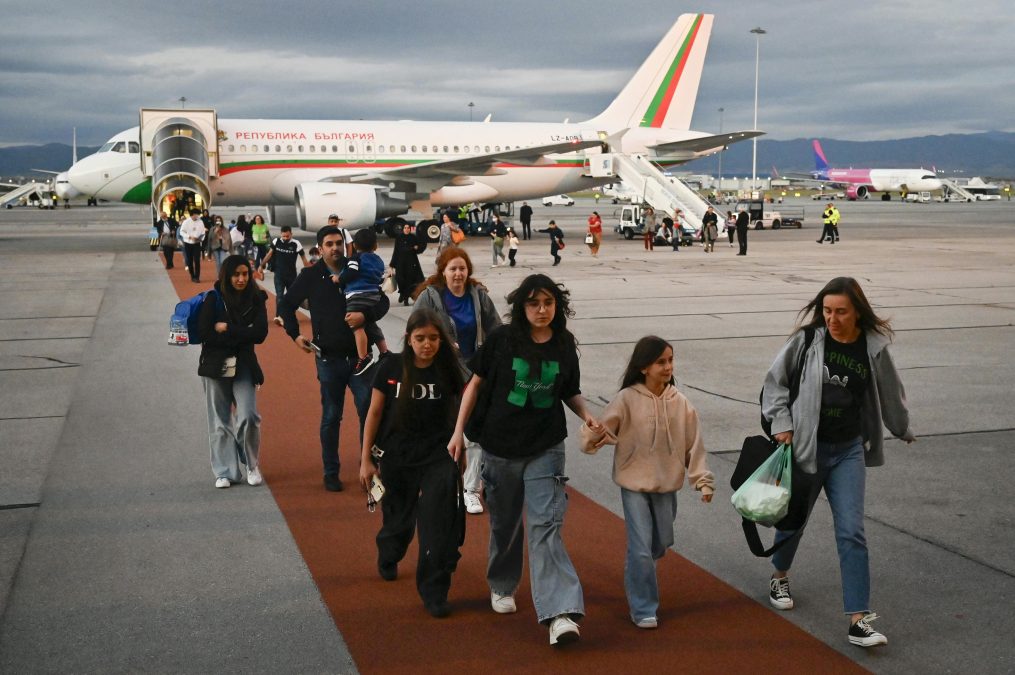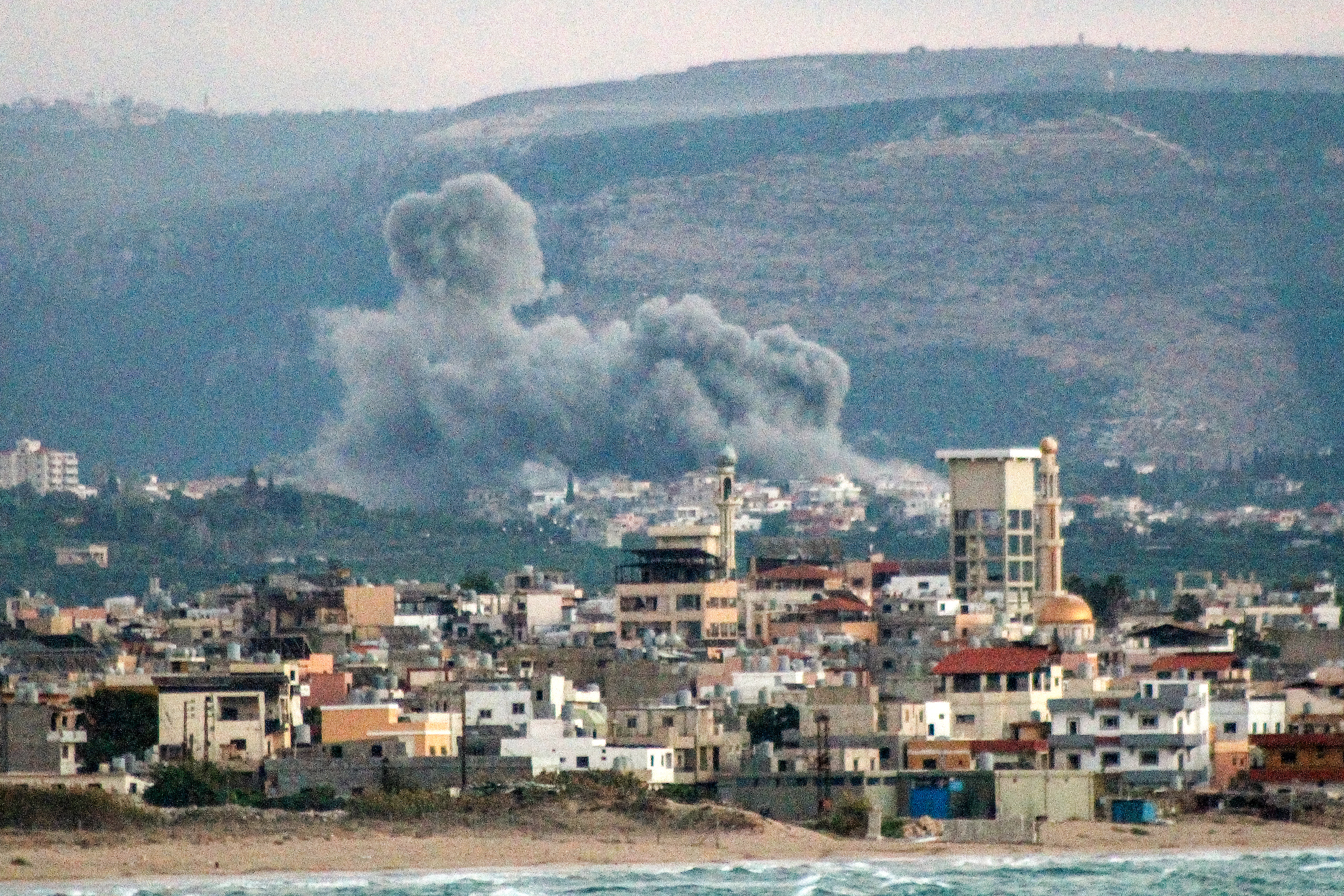Beirut/Jerusalem — Israeli forces have launched limited incursions in Lebanon, the United States said Monday, as Israel vowed to keep fighting Hezbollah and sealed part of the border after killing the Iran-backed militants’ leader.
Israel’s Defense Minister Yoav Gallant warned the battle was not over even after the massive Friday strike on Beirut that killed Hezbollah chief Hassan Nasrallah, dealing the group a seismic blow.
World leaders have urged diplomacy and de-escalation, with United Nations Secretary-General Antonio Guterres’s spokesman Stephane Dujarric saying: “We do not want any sort of ground invasion.”
Israeli officials “have informed us that they are currently conducting… limited operations targeting Hezbollah infrastructure near the border”, US State Department spokesman Matthew Miller told journalists.
Hezbollah fighters were “ready if Israel decides to enter by land”, deputy leader Naim Qassem said in a first televised address since Nasrallah’s death.
Lebanon’s national army, dwarfed by Hezbollah’s military power, was “repositioning” troops farther from the border, a military official told AFP.
And United Nations peacekeepers in Lebanon were no longer able to conduct patrols “given the intensity of the rockets going back and forth”, Dujarric said.
US President Joe Biden, whose country is Israel’s main weapons supplier, earlier on Monday indicated he opposes an Israeli ground operation.
“We should have a ceasefire now,” he said.
In northern Israel, near the Lebanese border, Gallant said that “we will use all the means that may be required… from the air, from the sea, and on land” to restore calm.
He said the killing of Nasrallah “is an important step, but it is not the final one.”
Lebanon’s state-run National News Agency reported “heavy artillery shelling” at a border village in the country’s south.
Hezbollah began low-intensity strikes on Israeli troops a day after its Palestinian ally Hamas staged its unprecedented attack on Israel on October 7 which triggered war in the Gaza Strip.
The border clashes rapidly escalated in September, leaving people across the region fearful of even more violence to come.
Israel said earlier this month that it was shifting its focus from Gaza to securing its northern border.
On Monday the army declared an area of the border strip a “closed military zone”.
Israel’s strikes on Lebanon have killed hundreds of people over the past week and forced up to a million to flee their homes, according to Lebanese officials.
Hezbollah and other groups launched rockets, drones and some missiles at Israel over the same period, causing some injuries but no deaths.
Lebanese Prime Minister Najib Mikati called for a ceasefire based on a recent US-French proposal, urging “an end to the Israeli aggression against Lebanon”.
Most of Israel’s strikes have targeted Hezbollah strongholds in eastern and southern Lebanon and the southern suburbs of Beirut, the group’s main bastion.
Hamas said its leader in Lebanon, Fatah Sharif Abu al-Amine, was killed along with his wife and two children in a strike on Al-Bass refugee camp in south Lebanon. The Israeli military confirmed it had killed Sharif.
On Monday, an Israeli strike hit a building in central Beirut, with an armed Palestinian group saying it had killed three of its members.
The strike, the first in the city center in years, sparked panic.
Central Beirut resident Kahier Bannout, 42, said it was “supposed to be a safe area — not a war zone”.
“Everyone is afraid.”
Lebanon’s Health Minister Firass Abiad said more than 1,000 people have been killed since September 17.
UN refugee agency chief Filippo Grandi said “well over 200,000 people are displaced inside Lebanon”, while more than 100,000 have fled to neighboring Syria.
European Union foreign policy chief Josep Borrell, after emergency talks between the bloc’s top diplomats, warned that “any further military intervention will dramatically aggravate the situation and it has to be avoided”.
“The sovereignty of both Israel and Lebanon has to be guaranteed,” he said.
French Foreign Minister Jean-Noel Barrot, the first high-level diplomat to visit Beirut since the Israeli strikes intensified, on Monday urged Israel “to refrain from any ground incursion”.
“There is still hope” for a ceasefire, he said, “but there is little time”.
US Secretary of State Antony Blinken said diplomacy was the best path forward for the region.
Washington “will continue to work… to advance a diplomatic resolution” for the Israel-Lebanon border, and for a Gaza ceasefire and hostage-release deal, he said.
The US, Qatar and Egypt tried for months to broker such a deal, which Netanyahu’s domestic critics accused him of obstructing.
In Gaza, AFP journalists said the number of Israeli air strikes has dropped significantly in recent days.
A UN Satellite Centre assessment issued Monday said “two-thirds of the total structures in the Gaza Strip have sustained damage” in nearly a year of war.
With schools not operating and many of them destroyed, children in Gaza “are not allowed to have the life of normal children, no education, no play, no joy”, UNICEF spokesman for the Palestinian territories Jonathan Crickx told AFP after a mission to Gaza.
Earlier, Israel’s Defense Minister Yoav Gallant on Monday said ground forces could be used against Hezbollah militants in Lebanon, adding military operations will go on despite the killing of the group’s leader Hassan Nasrallah.
Gallant made the comments while speaking to Israeli troops deployed to the northern border where cross-border fire with Hezbollah continued for nearly a year but escalated this month.
“We will use all the means that may be required — your forces, other forces, from the air, from the sea, and on land,” Gallant said.
“The elimination of Nasrallah is an important step, but it is not the final one”.
Fighting had been relatively contained until the current escalation.
Tens of thousands of Israeli residents were evacuated from their country’s northern border area nearly a year ago.

“Our goal is to ensure the (safe) return of Israel’s northern communities to their homes. We are prepared to make every effort necessary to accomplish this mission,” said Gallant
Israel said earlier this month that it was shifting its focus from Gaza to securing the northern border with Lebanon.
Paris and Washington, joined by Arab, Western and European countries, called last week for Israel and Hezbollah to agree an “immediate 21-day ceasefire” and to “give diplomacy a chance”.
Israel dismissed the plan, increasing its strikes on Lebanon’s south, east and Beirut’s southern suburbs and on Friday killing Hezbollah leader Hassan Nasrallah.
Since mid-September, Israeli strikes across Lebanon have killed more than 1,000 people, authorities said.
NETANYAHU WARNING TO IRAN
In Jerusalem, Israeli Prime Minister Benjamin Netanyahu issued a fresh warning to Iran Monday, saying there was no place in the Middle East beyond Israel’s reach amid a flurry of strikes against Hezbollah in Lebanon.
In a video statement made in English, Netanyahu addressed the people of Iran and warned that their government was bringing them “closer to the abyss”.
“With every passing moment, the regime is bringing you — the noble Persian people — closer to the abyss,” said Netanyahu.
“There is nowhere in the Middle East Israel cannot reach,” the prime minister added, warning the people of Iran that their “regime plunges our region deeper into darkness and deeper into war”.
“Don’t let a small group of theocrats crush your hopes and your dreams,” Netanyahu said.
Iran has also vowed to avenge the killing of Abbas Nilforoushan, a top commander of the Quds Force, the foreign operations arm of Iran’s Islamic Revolutionary Guard Corps, who died alongside the Hezbollah leader on Friday.
In his video statement, Netanyahu expressed hope for a future “when Iran is finally free”, saying it would “come a lot sooner than people think”.
“Everything will be different,” he said. “Our two countries, Israel and Iran, will be at peace. Iran will thrive as never before.”
Netanyahu’s comments came hours after Iran’s foreign ministry spokesman said the country had no plans to send its fighters to directly confront Israel.
“There is no need to send extra or volunteer forces of the Islamic Republic of Iran,” said foreign ministry spokesman Nasser Kanani, adding that Lebanon and fighters in the Palestinian territories “have the capability and strength to defend themselves against the aggression”.
Earlier Monday, Iranian President Masoud Pezeshkian visited Hezbollah’s office in Tehran “to pay tribute” to Nasrallah, according to the government’s website.
Supreme leader Ayatollah Ali Khamenei — who has the final say in all matters of the state in Iran — has vowed that Nasrallah’s death “will not be in vain”.
Khamenei said Israel was “too weak to cause significant damage to the solid construction of Hezbollah in Lebanon” and called on the “Axis of Resistance” to stand with Hezbollah.
“Lebanon will make the aggressor and the evil enemy regretful,” he said.








